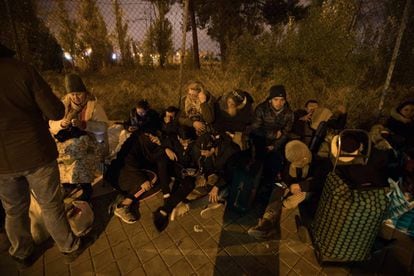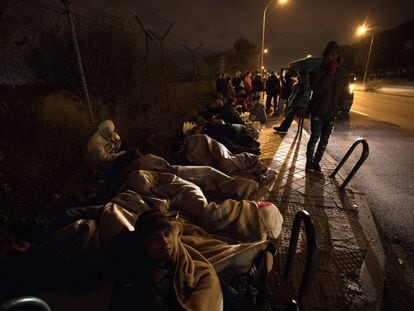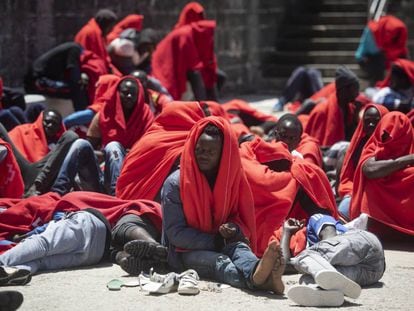Only one in four asylum requests are being accepted in Spain
Germany received nearly three times as many applications last year and granted protection to 50% of them, according to the Spanish Refugee Support Commission


Spain received a record-breaking 54,000 requests for asylum in 2018, making it one of the five countries in Europe with the highest number of applications. But it accepted a far lower rate of requests than other European countries facing the same demands. In 2018, just 12,000 requests were resolved in Spain, and just one in four asylum seekers was granted protection.
We continue to see that our generosity and application of international protection are very limited
The acceptance rate has fallen from 35% to 24% – the lowest rate of the seven European countries that have the highest number of requests for asylum (Germany, Greece, Sweden, Italy, France and Spain), according to the Spanish Refugee Support Commission (CEAR). Germany tops the list, granting protection to 50% of 185,853 applications last year. “These numbers give us a negative image of our willingness to accept refugees,” said CEAR managing director, Estrella Galán.
The figures from 2018 also reveal the backlog at the Asylum Office, which reports to the Interior Ministry. Asylum requests are dealt with slowly. There are currently 78,710 applications yet to be processed, and each can take up to two years to be resolved. In December, the Spanish Socialist Party (PSOE) government announced an action plan with more staff and resources in an effort to speed up the process and resolve three times the number of requests this year. The Asylum Office has been staffed by just 60 people since it was founded in 1992, when Spain received hardly any asylum applications.
Of the 11,875 applications that were approved, only 575 – less than 5% – were granted refugee status, which provides the greatest level of protection and is indefinite. The rest were offered subsidiary protection, a temporary measure that is granted largely to people from Syria, Ukraine and Palestine. “We continue to see that our generosity and application of international protection are very limited. What’s more, asylum is not allowing thousands of people to slip in, as the alarmists claim,” said Galán.
Of the 11,875 applications that were approved, less than 5% were granted refugee status
More than a third of asylum applications to Spain have come from Venezuelans, who have been struggling with a deepening humanitarian and political crisis since 2016. But while there is high demand, only 30 Venezuelans were granted recognition. After Venezuelans, the highest number of requests came from Colombians (8,650), Syrians (2,775) and Hondurans (2,410).
For the second year in a row, applications from Moroccans received one of the highest approval rates. Most of these asylum seekers had been granted protection for their sexual orientation or gender identity, but others were victims of the Moroccan government’s repression of the Rif protest movement, which advocates for the rights of the Berber-speaking Rif region of northern Morocco. While Spain rejected 595 asylum requests, 55 others were recognized. This statistic undermines a statement by Consuelo Rumí, Spain’s secretary of state of migration, who claimed people from Morocco were not “granted asylum or refuge.”
Obstacles
According to the head of CEAR’s legal department, Paloma Favieres, “2018 has been the year that has placed the most obstacles in the way of people trying to request asylum.” The lawyer explains that dozens of people have had trouble arranging the meeting that begins the administrative process to request asylum. In Madrid, entire families are forced to sleep on the street outside the immigration office due to limits on daily applications, says Favieres. There are other, less-visible obstacles, she adds, pointing out that potential refugees have trouble getting to Spain because they are not given transit visas. Favieres says one of the “challenges” is encouraging asylum applications in embassies and consulates, where just 370 requests were processed last year by relatives who had already been given protection.
“Such a long process restricts my new life”
Jessica Cisnero was involved in the anti-government protests that swept across Nicaragua in April last year. She was part of a youth movement in disadvantaged areas and continued to organize resistance, despite harassment from groups linked to the government of Daniel Ortega and the paramilitary repression. "On April 19, they killed the first young person and at the end of the month there were already around 20 deaths," she says.
In May, Cisnero decided to launch an awareness campaign overseas to denounce what was happening in the country. But when she wanted to return to Nicaragua, she knew she would be targeted by the authorities. "The government was looking for us as protest organizers and they recommended we not return," she explains.
Cisneros asked for international protection in Spain in May last year and since then has been waiting for a decision on her case. "What's most difficult is the psychological and emotional shock during this process of change," she says. "Such long processes end up restricting a new life. In my case, I have no work permit, nor can I access scholarships or studies. I depend on the solidarity of other people to survive."
English version by Melissa Kitson.












































